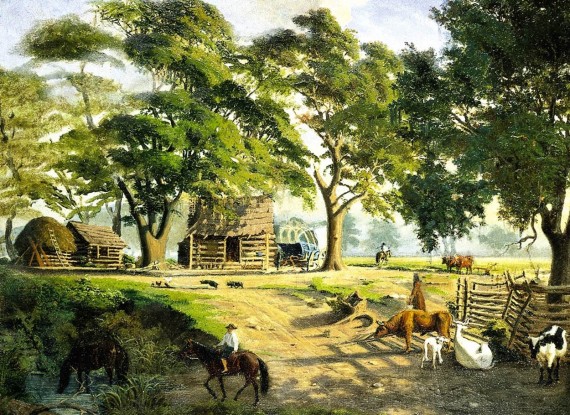Growing up in rural southern Arkansas, I believed that art was as foreign to our people as a goose egg is to the North Pole. My part of the Arkansas Delta was nothing but cotton fields and pine trees that stretched so far one could be forgiven for thinking there was nothing at all on the other side, that the world just ended there, like some Medieval map. A a line from a song that was popular when I was kid captured the sentiment well:
Bobby told Lucy, “The world ain’t round…
Drops off sharp at the edge of town
Lucy, you know the world must be flat
‘Cause when people leave town, they never come back”
Surely, beyond the pine thickets, the red clay, the paper mills and cotton gins and the wild-eyed preachers, there was a ledge that you would step right off of, and vanish.
My little world was peopled by men who yanked transmissions out of V8 engines hanging from tree limbs by a chain, their knuckles busted and bleeding from slipping wrenches, their necks heavy with grease and sweat and worry. It was a world graced with women like my grandmother who poked holes in her fingers for a living, pushing needles at the shirt factory; ladies like Miss JoeAnne Moffet whose hands were as rough and knotted as a hickory stump from years spent earning a living on the backend of a garden hoe. These were not the kind of people who went to art galleries or purchased naked Italian sculptures. The pictures on our walls were of aunts, uncles, Franklin Roosevelt and Jesus. “Art” was for the rich folks who lived in the big houses on Main Street. The ones who owned the banks and signed the checks. Their walls of eggshell white and delicate yellows were sometimes lined with portraits of thin-nosed matriarchs and oil paintings of the grandaddy who survived The Wo-ah Between the States and lived long enough to strike it rich in the timber business. But even then, no one ever talked of Picasso or Rembrandt, or knew a surrealist from styrofoam.
We didn’t have portraits in our houses. We kept up the record of our kin in hand-me-down black and white photos, Walmart polaroids, and in the notes scrawled in the flyleaf of the Family Bible. The deeds of our clan were not the kind that get immortalized in oil or watercolor anyway, they were the kind that get a fella photographed from the front and side holding numbers in front of his chest.
Until I came along, no one in my family had ever gone to an art gallery –they went to work. Instead of Caravaggios, we had wall calendars from Woodmen of the World in return for buying our ten-dollar-a-month life insurance policies. Instead of sculpture, we had mason jars full of peppers and okra and bathtub whiskey. My grandfather said to me recently, “We didn’t go to concerts, we went to church and to honky tonks. Our music came either from the choir on Sunday or the Opry on Saturday night.” When I asked if that was what they did to get a bit of culture he looked at me like I had two heads. “We wadn’t trying to get culture,” he said, “We was just tryin’ to get by.”
Now that I am a grown man I know that ours was a region teeming with art. Art was the quilts the church ladies sewed, turning scraps of cloth into beautiful tapestries. Art was the stories the gray heads told on front porches and back seats of fishing boats.
Art was the cabinets my papaw made with arthritic hands and without the aid of power tools. It was in the egg baskets women wove, the patterns as intricate as spider webs. Art was the cornices my cousins carved and lattices my uncles hammered into place, dangling from ladders, ten-penny nails between their teeth.
This patch of earth that I call home is a cultural center that need not take a back seat to any place. My people may have a whole cemetery’s worth of skeletons rattling around in their closet, but there’s art in those old bones. My neighbors may have a secondhand barcalounger on the porch outside their double-wide, but by God they have art in them.







“This patch of earth that I call home is a cultural center that need not take a back seat to any place.”
Damn right!
speaking of woodmen of the world shockingly they are trying tp close our local chapter my brother almost died and the reason he is still alive
is i said “NO” to the doctor i gave a speech in Agora to save our chapter they thought it was fine speech but didn’t do anything i did send y’all
small contribution. i was told to call corporate they said they need 2023 financial report and a new election of officers. Can y’all please do
what y’all can to save our chapter please contact out community outreach advisor Glenda Davis at 478 -972-1067 and 478-449-9065
and do all you can to save our chapter please i feel about our chapter like i do about my brother the chapter is family THANKS